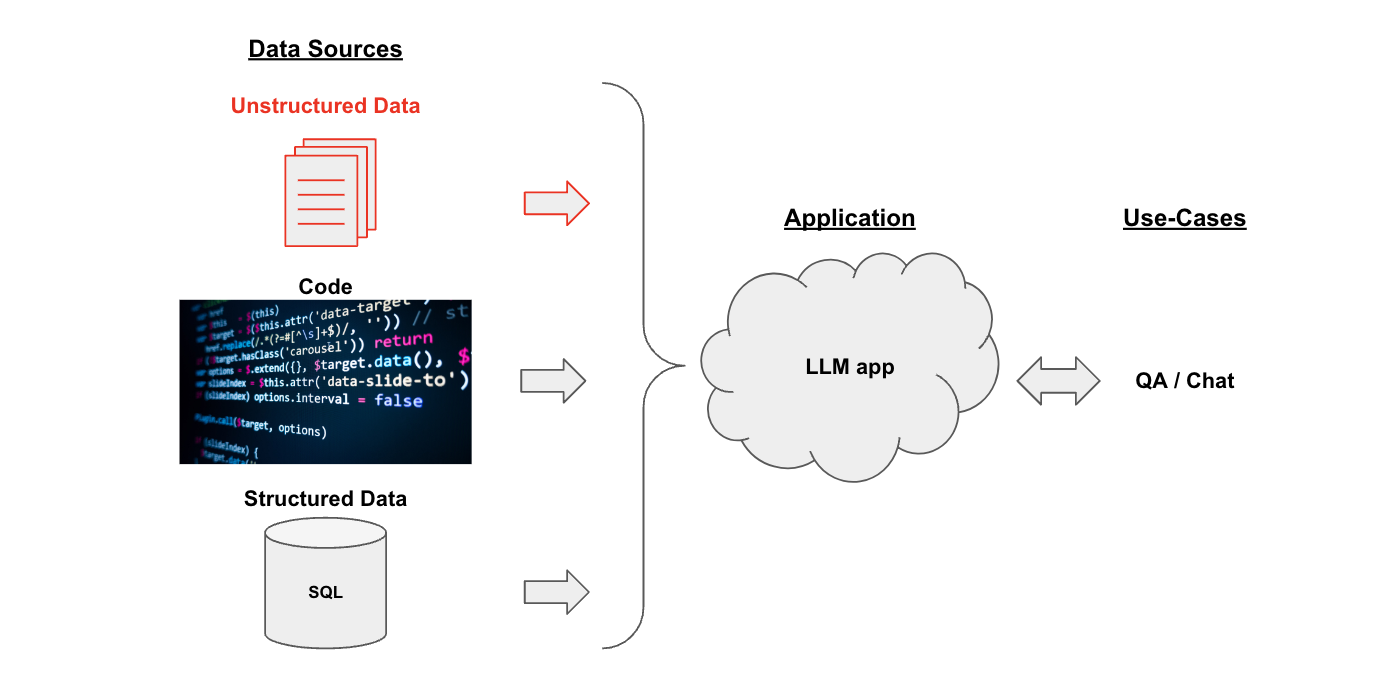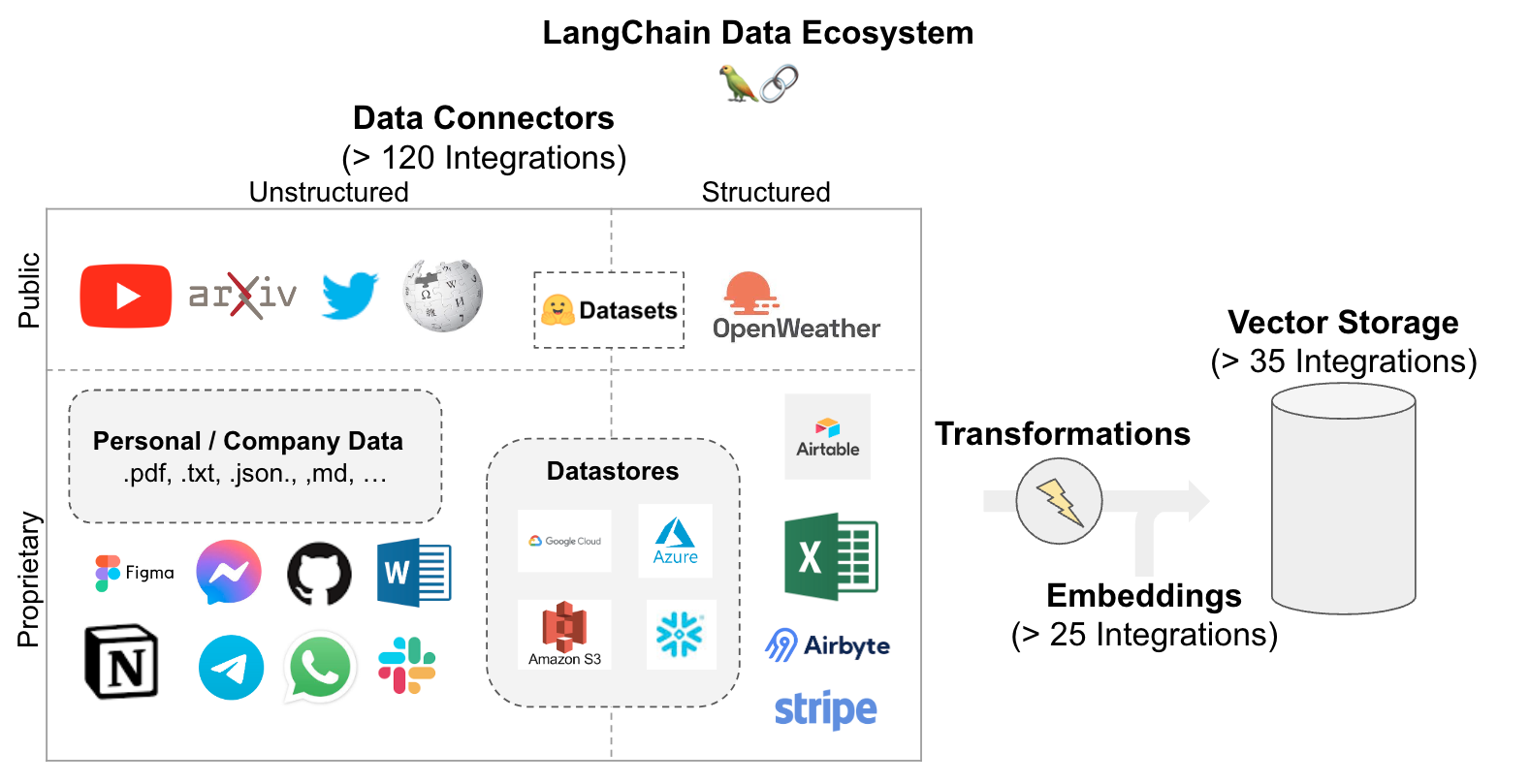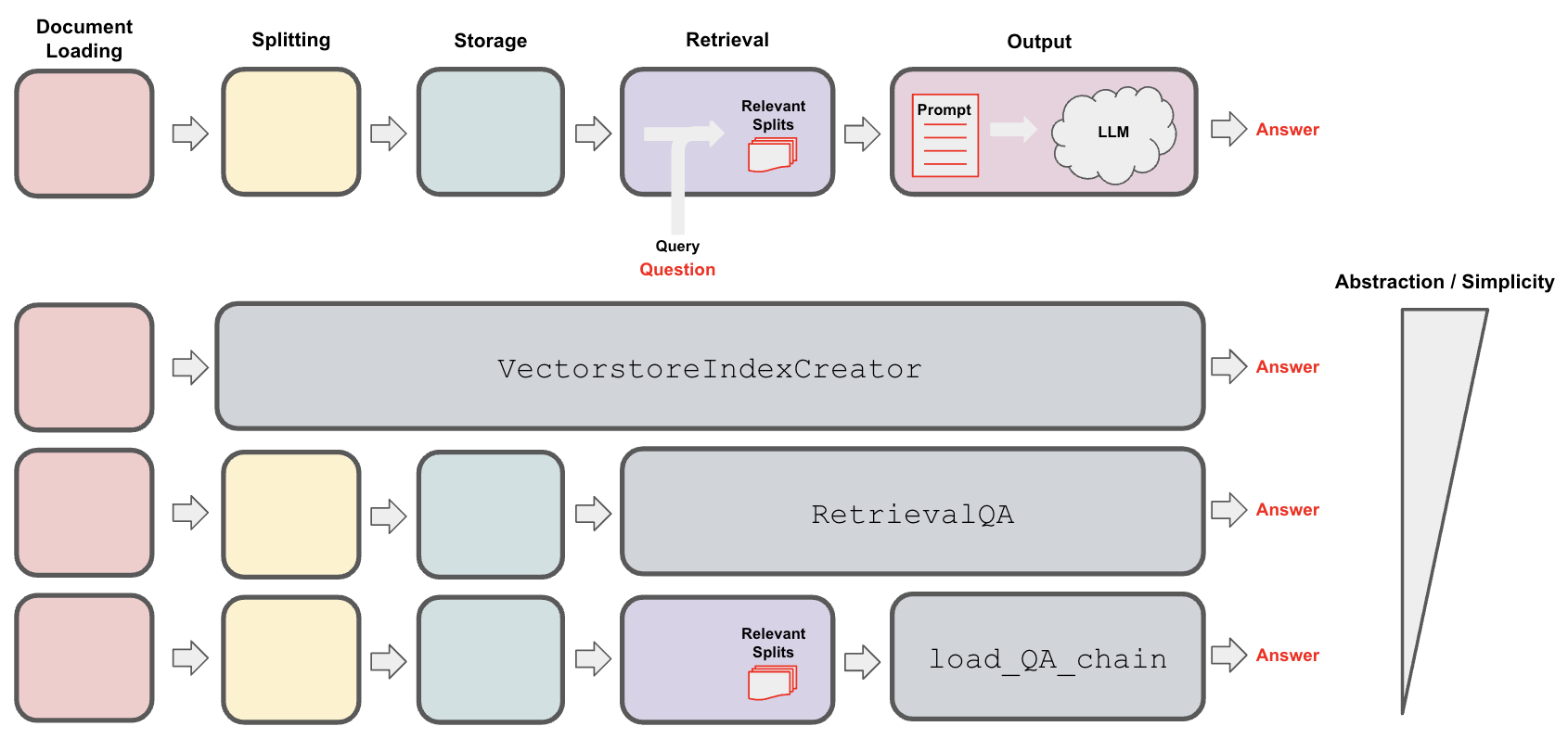QA and Chat over Documents
Chat and Question-Answering (QA) over data are popular LLM use-cases.
data can include many things, including:
Unstructured data(e.g., PDFs)Structured data(e.g., SQL)Code(e.g., Python)
LangChain supports Chat and QA on various data types:
Below we will review Chat and QA on Unstructured data.

Unstructured data can be loaded from many sources.
Use the LangChain integration hub to browse the full set of loaders.
Each loader returns data as a LangChain Document.
Documents are turned into a Chat or QA app following the general steps below:
Splitting: Text splitters breakDocumentsinto splits of specified sizeStorage: Storage (e.g., often a vectorstore) will house and often embed the splitsRetrieval: The app retrieves splits from storage (e.g., often with similar embeddings to the input question)Output: An LLM produces an answer using a prompt that includes the question and the retrieved splits

Quickstart
The above pipeline can be wrapped with a VectorstoreIndexCreator.
In particular:
- Specify a
Documentloader - The
splitting,storage,retrieval, andoutputgeneration stages are wrapped
Let's load this blog post on agents as an example Document.
We have a QA app in a few lines of code.
Set environment variables and get packages:
pip install openai
pip install chromadb
export OPENAI_API_KEY="..."
Run:
from langchain.document_loaders import WebBaseLoader
from langchain.indexes import VectorstoreIndexCreator
# Document loader
loader = WebBaseLoader("https://lilianweng.github.io/posts/2023-06-23-agent/")
# Index that wraps above steps
index = VectorstoreIndexCreator().from_loaders([loader])
# Question-answering
question = "What is Task Decomposition?"
index.query(question)
API Reference:
- WebBaseLoader from
langchain.document_loaders - VectorstoreIndexCreator from
langchain.indexes
' Task decomposition is a technique used to break down complex tasks into smaller and simpler steps. It can be done using LLM with simple prompting, task-specific instructions, or human inputs. Tree of Thoughts (Yao et al. 2023) is an example of a task decomposition technique that explores multiple reasoning possibilities at each step and generates multiple thoughts per step, creating a tree structure.'
Of course, some users do not want this level of abstraction.
Below, we will discuss each stage in more detail.
1. Loading, Splitting, Storage
1.1 Getting started
Specify a Document loader.
# Document loader
from langchain.document_loaders import WebBaseLoader
loader = WebBaseLoader("https://lilianweng.github.io/posts/2023-06-23-agent/")
data = loader.load()
API Reference:
- WebBaseLoader from
langchain.document_loaders
Split the Document into chunks for embedding and vector storage.
# Split
from langchain.text_splitter import RecursiveCharacterTextSplitter
text_splitter = RecursiveCharacterTextSplitter(chunk_size = 500, chunk_overlap = 0)
all_splits = text_splitter.split_documents(data)
API Reference:
- RecursiveCharacterTextSplitter from
langchain.text_splitter
Embed and store the splits in a vector database (Chroma).
# Store
from langchain.vectorstores import Chroma
from langchain.embeddings import OpenAIEmbeddings
vectorstore = Chroma.from_documents(documents=all_splits,embedding=OpenAIEmbeddings())
API Reference:
- Chroma from
langchain.vectorstores - OpenAIEmbeddings from
langchain.embeddings
Here are the three pieces together:

1.2 Going Deeper
1.2.1 Integrations
Document Loaders
Document Transformers
All can ingest loaded
Documentsand process them (e.g., split).See further documentation on transformers here.
Vectorstores
1.2.2 Retaining metadata
Context-aware splitters keep the location ("context") of each split in the original Document:
2. Retrieval
2.1 Getting started
Retrieve relevant splits for any question using similarity_search.
question = "What are the approaches to Task Decomposition?"
docs = vectorstore.similarity_search(question)
len(docs)
4
2.2 Going Deeper
2.2.1 Retrieval
Vectorstores are commonly used for retrieval.
But, they are not the only option.
For example, SVMs (see thread here) can also be used.
LangChain has many retrievers including, but not limited to, vectorstores.
All retrievers implement some common methods, such as get_relevant_documents().
from langchain.retrievers import SVMRetriever
svm_retriever = SVMRetriever.from_documents(all_splits,OpenAIEmbeddings())
docs_svm=svm_retriever.get_relevant_documents(question)
len(docs_svm)
API Reference:
- SVMRetriever from
langchain.retrievers
4
2.2.2 Advanced retrieval
Improve on similarity_search:
MultiQueryRetrievergenerates variants of the input question to improve retrieval.Max marginal relevanceselects for relevance and diversity among the retrieved documents.Documents can be filtered during retrieval using
metadatafilters.
# MultiQueryRetriever
import logging
from langchain.chat_models import ChatOpenAI
from langchain.retrievers.multi_query import MultiQueryRetriever
logging.basicConfig()
logging.getLogger('langchain.retrievers.multi_query').setLevel(logging.INFO)
retriever_from_llm = MultiQueryRetriever.from_llm(retriever=vectorstore.as_retriever(),
llm=ChatOpenAI(temperature=0))
unique_docs = retriever_from_llm.get_relevant_documents(query=question)
len(unique_docs)
API Reference:
- ChatOpenAI from
langchain.chat_models - MultiQueryRetriever from
langchain.retrievers.multi_query
INFO:langchain.retrievers.multi_query:Generated queries: ['1. How can Task Decomposition be approached?', '2. What are the different methods for Task Decomposition?', '3. What are the various approaches to decomposing tasks?']
5
3. QA
3.1 Getting started
Distill the retrieved documents into an answer using an LLM (e.g., gpt-3.5-turbo) with RetrievalQA chain.
from langchain.chat_models import ChatOpenAI
llm = ChatOpenAI(model_name="gpt-3.5-turbo", temperature=0)
from langchain.chains import RetrievalQA
qa_chain = RetrievalQA.from_chain_type(llm,retriever=vectorstore.as_retriever())
qa_chain({"query": question})
API Reference:
- ChatOpenAI from
langchain.chat_models - RetrievalQA from
langchain.chains
{'query': 'What are the approaches to Task Decomposition?',
'result': 'The approaches to task decomposition include:\n\n1. Simple prompting: This approach involves using simple prompts or questions to guide the agent in breaking down a task into smaller subgoals. For example, the agent can be prompted with "Steps for XYZ" and asked to list the subgoals for achieving XYZ.\n\n2. Task-specific instructions: In this approach, task-specific instructions are provided to the agent to guide the decomposition process. For example, if the task is to write a novel, the agent can be instructed to "Write a story outline" as a subgoal.\n\n3. Human inputs: This approach involves incorporating human inputs in the task decomposition process. Humans can provide guidance, feedback, and suggestions to help the agent break down complex tasks into manageable subgoals.\n\nThese approaches aim to enable efficient handling of complex tasks by breaking them down into smaller, more manageable parts.'}
3.2 Going Deeper
3.2.1 Integrations
LLMs
3.2.2 Running LLMs locally
The popularity of PrivateGPT and GPT4All underscore the importance of running LLMs locally.
LangChain has integrations with many open source LLMs that can be run locally.
Using GPT4All is as simple as downloading the binary and then:
from langchain.llms import GPT4All
from langchain.chains import RetrievalQA
llm = GPT4All(model="/Users/rlm/Desktop/Code/gpt4all/models/nous-hermes-13b.ggmlv3.q4_0.bin",max_tokens=2048)
qa_chain = RetrievalQA.from_chain_type(llm,retriever=vectorstore.as_retriever())
API Reference:
- GPT4All from
langchain.llms - RetrievalQA from
langchain.chains
qa_chain({"query": question})
{'query': 'What are the approaches to Task Decomposition?',
'result': ' There are three main approaches to task decomposition: (1) using language models like GPT-3 for simple prompting such as "Steps for XYZ.\\n1.", (2) using task-specific instructions, and (3) with human inputs.'}
3.2.2 Customizing the prompt
The prompt in RetrievalQA chain can be easily customized.
# Build prompt
from langchain.prompts import PromptTemplate
template = """Use the following pieces of context to answer the question at the end.
If you don't know the answer, just say that you don't know, don't try to make up an answer.
Use three sentences maximum and keep the answer as concise as possible.
Always say "thanks for asking!" at the end of the answer.
{context}
Question: {question}
Helpful Answer:"""
QA_CHAIN_PROMPT = PromptTemplate(input_variables=["context", "question"],template=template,)
# Run chain
from langchain.chains import RetrievalQA
llm = ChatOpenAI(model_name="gpt-3.5-turbo", temperature=0)
qa_chain = RetrievalQA.from_chain_type(llm,
retriever=vectorstore.as_retriever(),
chain_type_kwargs={"prompt": QA_CHAIN_PROMPT})
result = qa_chain({"query": question})
result["result"]
API Reference:
- PromptTemplate from
langchain.prompts - RetrievalQA from
langchain.chains
'The approaches to Task Decomposition are (1) using simple prompting by LLM, (2) using task-specific instructions, and (3) with human inputs. Thanks for asking!'
3.2.3 Returning source documents
The full set of retrieved documents used for answer distillation can be returned using return_source_documents=True.
from langchain.chains import RetrievalQA
qa_chain = RetrievalQA.from_chain_type(llm,retriever=vectorstore.as_retriever(),
return_source_documents=True)
result = qa_chain({"query": question})
print(len(result['source_documents']))
result['source_documents'][0]
API Reference:
- RetrievalQA from
langchain.chains
4
Document(page_content='Task decomposition can be done (1) by LLM with simple prompting like "Steps for XYZ.\\n1.", "What are the subgoals for achieving XYZ?", (2) by using task-specific instructions; e.g. "Write a story outline." for writing a novel, or (3) with human inputs.', metadata={'source': 'https://lilianweng.github.io/posts/2023-06-23-agent/', 'title': "LLM Powered Autonomous Agents | Lil'Log", 'description': 'Building agents with LLM (large language model) as its core controller is a cool concept. Several proof-of-concepts demos, such as AutoGPT, GPT-Engineer and BabyAGI, serve as inspiring examples. The potentiality of LLM extends beyond generating well-written copies, stories, essays and programs; it can be framed as a powerful general problem solver.\nAgent System Overview In a LLM-powered autonomous agent system, LLM functions as the agent’s brain, complemented by several key components:', 'language': 'en'})
3.2.4 Citations
Answer citations can be returned using RetrievalQAWithSourcesChain.
from langchain.chains import RetrievalQAWithSourcesChain
qa_chain = RetrievalQAWithSourcesChain.from_chain_type(llm,retriever=vectorstore.as_retriever())
result = qa_chain({"question": question})
result
API Reference:
- RetrievalQAWithSourcesChain from
langchain.chains
{'question': 'What are the approaches to Task Decomposition?',
'answer': 'The approaches to Task Decomposition include (1) using LLM with simple prompting, (2) using task-specific instructions, and (3) incorporating human inputs.\n',
'sources': 'https://lilianweng.github.io/posts/2023-06-23-agent/'}
3.2.5 Customizing retrieved docs in the LLM prompt
Retrieved documents can be fed to an LLM for answer distillation in a few different ways.
stuff, refine, map-reduce, and map-rerank chains for passing documents to an LLM prompt are well summarized here.
stuff is commonly used because it simply "stuffs" all retrieved documents into the prompt.
The load_qa_chain is an easy way to pass documents to an LLM using these various approaches (e.g., see chain_type).
from langchain.chains.question_answering import load_qa_chain
chain = load_qa_chain(llm, chain_type="stuff")
chain({"input_documents": unique_docs, "question": question},return_only_outputs=True)
API Reference:
- load_qa_chain from
langchain.chains.question_answering
{'output_text': 'The approaches to task decomposition include (1) using simple prompting to break down tasks into subgoals, (2) providing task-specific instructions to guide the decomposition process, and (3) incorporating human inputs for task decomposition.'}
We can also pass the chain_type to RetrievalQA.
qa_chain = RetrievalQA.from_chain_type(llm,retriever=vectorstore.as_retriever(),
chain_type="stuff")
result = qa_chain({"query": question})
In summary, the user can choose the desired level of abstraction for QA:

4. Chat
4.1 Getting started
To keep chat history, first specify a Memory buffer to track the conversation inputs / outputs.
from langchain.memory import ConversationBufferMemory
memory = ConversationBufferMemory(memory_key="chat_history", return_messages=True)
API Reference:
- ConversationBufferMemory from
langchain.memory
The ConversationalRetrievalChain uses chat in the Memory buffer.
from langchain.chains import ConversationalRetrievalChain
retriever=vectorstore.as_retriever()
chat = ConversationalRetrievalChain.from_llm(llm,retriever=retriever,memory=memory)
API Reference:
- ConversationalRetrievalChain from
langchain.chains
result = chat({"question": "What are some of the main ideas in self-reflection?"})
result['answer']
"Some of the main ideas in self-reflection include:\n1. Iterative improvement: Self-reflection allows autonomous agents to improve by refining past action decisions and correcting mistakes.\n2. Trial and error: Self-reflection is crucial in real-world tasks where trial and error are inevitable.\n3. Two-shot examples: Self-reflection is created by showing pairs of failed trajectories and ideal reflections for guiding future changes in the plan.\n4. Working memory: Reflections are added to the agent's working memory, up to three, to be used as context for querying.\n5. Performance evaluation: Self-reflection involves continuously reviewing and analyzing actions, self-criticizing behavior, and reflecting on past decisions and strategies to refine approaches.\n6. Efficiency: Self-reflection encourages being smart and efficient, aiming to complete tasks in the least number of steps."
The Memory buffer has context to resolve "it" ("self-reflection") in the below question.
result = chat({"question": "How does the Reflexion paper handle it?"})
result['answer']
"The Reflexion paper handles self-reflection by showing two-shot examples to the Learning Language Model (LLM). Each example consists of a failed trajectory and an ideal reflection that guides future changes in the agent's plan. These reflections are then added to the agent's working memory, up to a maximum of three, to be used as context for querying the LLM. This allows the agent to iteratively improve its reasoning skills by refining past action decisions and correcting previous mistakes."
4.2 Going deeper
The documentation on ConversationalRetrievalChain offers a few extensions, such as streaming and source documents.